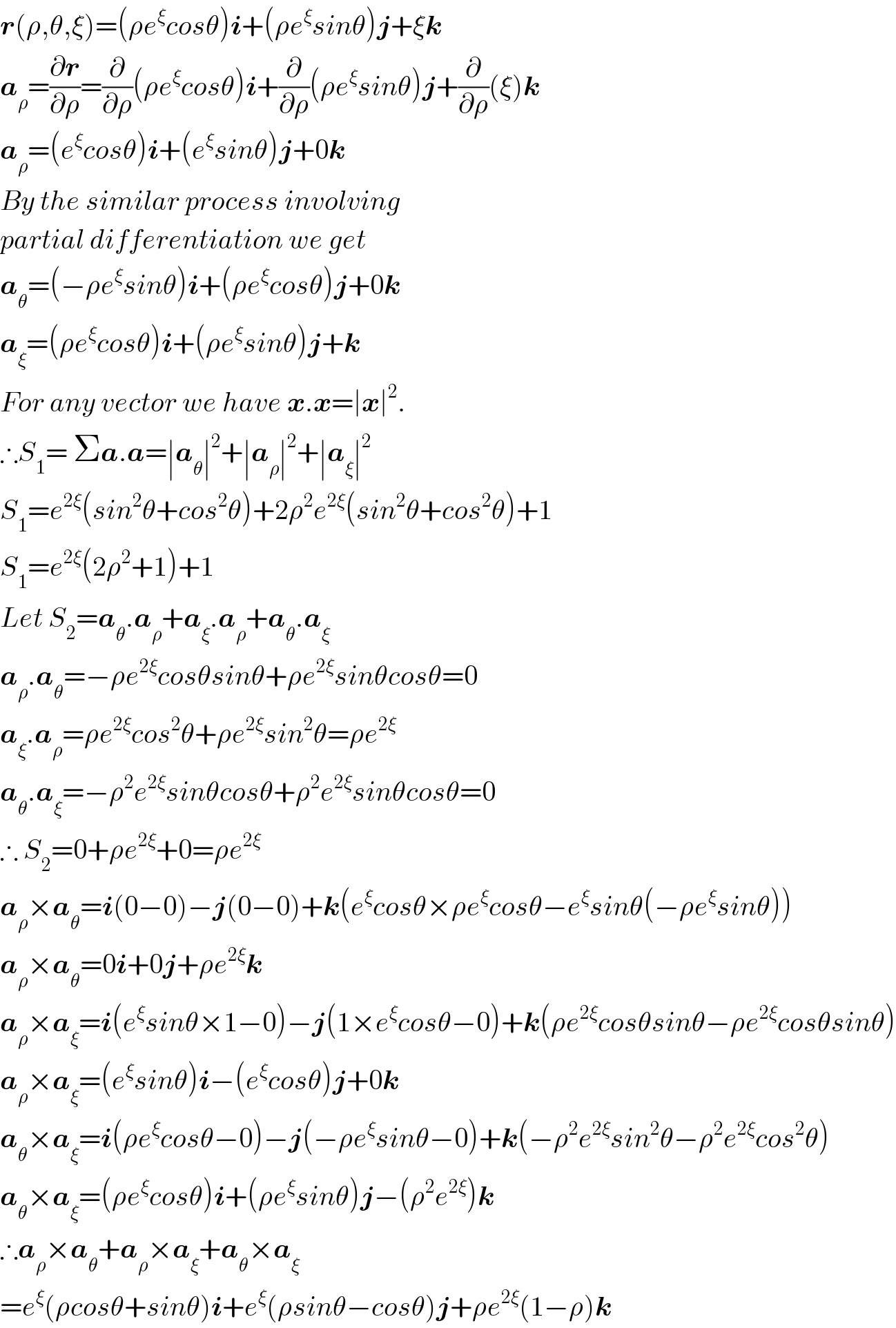
Question Number 1858 by 123456 last updated on 16/Oct/15
![[((x(ρ,θ,ξ))),((y(ρ,θ,ξ))),((z(ρ,θ,ξ))) ]= [((ρe^ξ cos θ)),((ρe^ξ sin θ)),(ξ) ] { ((ρ∈[0,+∞))),((θ∈[0,2π))),((ξ∈R)) :} r(ρ,θ,ξ)=x(ρ,θ,ξ)i+y(ρ,θ,ξ)j+z(ρ,θ,ξ)k a_ρ =(∂r/∂ρ) a_θ =(∂r/∂θ) a_ξ =(∂r/∂ξ) a_ρ ∙a_ρ +a_θ ∙a_θ +a_ξ ∙a_ξ =??? a_ρ ∙a_θ +a_ρ ∙a_ξ +a_θ ∙a_ξ =??? a_ρ ×a_θ +a_ρ ×a_ξ +a_θ ×a_ξ =???](Q1858.png)
$$\begin{bmatrix}{{x}\left(\rho,\theta,\xi\right)}\\{{y}\left(\rho,\theta,\xi\right)}\\{{z}\left(\rho,\theta,\xi\right)}\end{bmatrix}=\begin{bmatrix}{\rho{e}^{\xi} \mathrm{cos}\:\theta}\\{\rho{e}^{\xi} \mathrm{sin}\:\theta}\\{\xi}\end{bmatrix}\begin{cases}{\rho\in\left[\mathrm{0},+\infty\right)}\\{\theta\in\left[\mathrm{0},\mathrm{2}\pi\right)}\\{\xi\in\mathbb{R}}\end{cases} \\ $$$$\boldsymbol{{r}}\left(\rho,\theta,\xi\right)={x}\left(\rho,\theta,\xi\right)\boldsymbol{{i}}+{y}\left(\rho,\theta,\xi\right)\boldsymbol{{j}}+{z}\left(\rho,\theta,\xi\right)\boldsymbol{{k}} \\ $$$$\boldsymbol{{a}}_{\rho} =\frac{\partial\boldsymbol{{r}}}{\partial\rho} \\ $$$$\boldsymbol{{a}}_{\theta} =\frac{\partial\boldsymbol{{r}}}{\partial\theta} \\ $$$$\boldsymbol{{a}}_{\xi} =\frac{\partial\boldsymbol{{r}}}{\partial\xi} \\ $$$$\boldsymbol{{a}}_{\rho} \centerdot\boldsymbol{{a}}_{\rho} +\boldsymbol{{a}}_{\theta} \centerdot\boldsymbol{{a}}_{\theta} +\boldsymbol{{a}}_{\xi} \centerdot\boldsymbol{{a}}_{\xi} =??? \\ $$$$\boldsymbol{{a}}_{\rho} \centerdot\boldsymbol{{a}}_{\theta} +\boldsymbol{{a}}_{\rho} \centerdot\boldsymbol{{a}}_{\xi} +\boldsymbol{{a}}_{\theta} \centerdot\boldsymbol{{a}}_{\xi} =??? \\ $$$$\boldsymbol{{a}}_{\rho} ×\boldsymbol{{a}}_{\theta} +\boldsymbol{{a}}_{\rho} ×\boldsymbol{{a}}_{\xi} +\boldsymbol{{a}}_{\theta} ×\boldsymbol{{a}}_{\xi} =??? \\ $$
Answered by 112358 last updated on 16/Oct/15

$$\boldsymbol{{r}}\left(\rho,\theta,\xi\right)=\left(\rho{e}^{\xi} {cos}\theta\right)\boldsymbol{{i}}+\left(\rho{e}^{\xi} {sin}\theta\right)\boldsymbol{{j}}+\xi\boldsymbol{{k}} \\ $$$$\boldsymbol{{a}}_{\rho} =\frac{\partial\boldsymbol{{r}}}{\partial\rho}=\frac{\partial}{\partial\rho}\left(\rho{e}^{\xi} {cos}\theta\right)\boldsymbol{{i}}+\frac{\partial}{\partial\rho}\left(\rho{e}^{\xi} {sin}\theta\right)\boldsymbol{{j}}+\frac{\partial}{\partial\rho}\left(\xi\right)\boldsymbol{{k}} \\ $$$$\boldsymbol{{a}}_{\rho} =\left({e}^{\xi} {cos}\theta\right)\boldsymbol{{i}}+\left({e}^{\xi} {sin}\theta\right)\boldsymbol{{j}}+\mathrm{0}\boldsymbol{{k}} \\ $$$${By}\:{the}\:{similar}\:{process}\:{involving} \\ $$$${partial}\:{differentiation}\:{we}\:{get} \\ $$$$\boldsymbol{{a}}_{\theta} =\left(−\rho{e}^{\xi} {sin}\theta\right)\boldsymbol{{i}}+\left(\rho{e}^{\xi} {cos}\theta\right)\boldsymbol{{j}}+\mathrm{0}\boldsymbol{{k}} \\ $$$$\boldsymbol{{a}}_{\xi} =\left(\rho{e}^{\xi} {cos}\theta\right)\boldsymbol{{i}}+\left(\rho{e}^{\xi} {sin}\theta\right)\boldsymbol{{j}}+\boldsymbol{{k}} \\ $$$${For}\:{any}\:{vector}\:{we}\:{have}\:\boldsymbol{{x}}.\boldsymbol{{x}}=\mid\boldsymbol{{x}}\mid^{\mathrm{2}} . \\ $$$$\therefore{S}_{\mathrm{1}} =\:\Sigma\boldsymbol{{a}}.\boldsymbol{{a}}=\mid\boldsymbol{{a}}_{\theta} \mid^{\mathrm{2}} +\mid\boldsymbol{{a}}_{\rho} \mid^{\mathrm{2}} +\mid\boldsymbol{{a}}_{\xi} \mid^{\mathrm{2}} \\ $$$${S}_{\mathrm{1}} ={e}^{\mathrm{2}\xi} \left({sin}^{\mathrm{2}} \theta+{cos}^{\mathrm{2}} \theta\right)+\mathrm{2}\rho^{\mathrm{2}} {e}^{\mathrm{2}\xi} \left({sin}^{\mathrm{2}} \theta+{cos}^{\mathrm{2}} \theta\right)+\mathrm{1} \\ $$$${S}_{\mathrm{1}} ={e}^{\mathrm{2}\xi} \left(\mathrm{2}\rho^{\mathrm{2}} +\mathrm{1}\right)+\mathrm{1} \\ $$$${Let}\:{S}_{\mathrm{2}} =\boldsymbol{{a}}_{\theta} .\boldsymbol{{a}}_{\rho} +\boldsymbol{{a}}_{\xi} .\boldsymbol{{a}}_{\rho} +\boldsymbol{{a}}_{\theta} .\boldsymbol{{a}}_{\xi} \\ $$$$\boldsymbol{{a}}_{\rho} .\boldsymbol{{a}}_{\theta} =−\rho{e}^{\mathrm{2}\xi} {cos}\theta{sin}\theta+\rho{e}^{\mathrm{2}\xi} {sin}\theta{cos}\theta=\mathrm{0} \\ $$$$\boldsymbol{{a}}_{\xi} .\boldsymbol{{a}}_{\rho} =\rho{e}^{\mathrm{2}\xi} {cos}^{\mathrm{2}} \theta+\rho{e}^{\mathrm{2}\xi} {sin}^{\mathrm{2}} \theta=\rho{e}^{\mathrm{2}\xi} \\ $$$$\boldsymbol{{a}}_{\theta} .\boldsymbol{{a}}_{\xi} =−\rho^{\mathrm{2}} {e}^{\mathrm{2}\xi} {sin}\theta{cos}\theta+\rho^{\mathrm{2}} {e}^{\mathrm{2}\xi} {sin}\theta{cos}\theta=\mathrm{0} \\ $$$$\therefore\:{S}_{\mathrm{2}} =\mathrm{0}+\rho{e}^{\mathrm{2}\xi} +\mathrm{0}=\rho{e}^{\mathrm{2}\xi} \\ $$$$\boldsymbol{{a}}_{\rho} ×\boldsymbol{{a}}_{\theta} =\boldsymbol{{i}}\left(\mathrm{0}−\mathrm{0}\right)−\boldsymbol{{j}}\left(\mathrm{0}−\mathrm{0}\right)+\boldsymbol{{k}}\left({e}^{\xi} {cos}\theta×\rho{e}^{\xi} {cos}\theta−{e}^{\xi} {sin}\theta\left(−\rho{e}^{\xi} {sin}\theta\right)\right) \\ $$$$\boldsymbol{{a}}_{\rho} ×\boldsymbol{{a}}_{\theta} =\mathrm{0}\boldsymbol{{i}}+\mathrm{0}\boldsymbol{{j}}+\rho{e}^{\mathrm{2}\xi} \boldsymbol{{k}} \\ $$$$\boldsymbol{{a}}_{\rho} ×\boldsymbol{{a}}_{\xi} =\boldsymbol{{i}}\left({e}^{\xi} {sin}\theta×\mathrm{1}−\mathrm{0}\right)−\boldsymbol{{j}}\left(\mathrm{1}×{e}^{\xi} {cos}\theta−\mathrm{0}\right)+\boldsymbol{{k}}\left(\rho{e}^{\mathrm{2}\xi} {cos}\theta{sin}\theta−\rho{e}^{\mathrm{2}\xi} {cos}\theta{sin}\theta\right) \\ $$$$\boldsymbol{{a}}_{\rho} ×\boldsymbol{{a}}_{\xi} =\left({e}^{\xi} {sin}\theta\right)\boldsymbol{{i}}−\left({e}^{\xi} {cos}\theta\right)\boldsymbol{{j}}+\mathrm{0}\boldsymbol{{k}} \\ $$$$\boldsymbol{{a}}_{\theta} ×\boldsymbol{{a}}_{\xi} =\boldsymbol{{i}}\left(\rho{e}^{\xi} {cos}\theta−\mathrm{0}\right)−\boldsymbol{{j}}\left(−\rho{e}^{\xi} {sin}\theta−\mathrm{0}\right)+\boldsymbol{{k}}\left(−\rho^{\mathrm{2}} {e}^{\mathrm{2}\xi} {sin}^{\mathrm{2}} \theta−\rho^{\mathrm{2}} {e}^{\mathrm{2}\xi} {cos}^{\mathrm{2}} \theta\right) \\ $$$$\boldsymbol{{a}}_{\theta} ×\boldsymbol{{a}}_{\xi} =\left(\rho{e}^{\xi} {cos}\theta\right)\boldsymbol{{i}}+\left(\rho{e}^{\xi} {sin}\theta\right)\boldsymbol{{j}}−\left(\rho^{\mathrm{2}} {e}^{\mathrm{2}\xi} \right)\boldsymbol{{k}} \\ $$$$\therefore\boldsymbol{{a}}_{\rho} ×\boldsymbol{{a}}_{\theta} +\boldsymbol{{a}}_{\rho} ×\boldsymbol{{a}}_{\xi} +\boldsymbol{{a}}_{\theta} ×\boldsymbol{{a}}_{\xi} \\ $$$$={e}^{\xi} \left(\rho{cos}\theta+{sin}\theta\right)\boldsymbol{{i}}+{e}^{\xi} \left(\rho{sin}\theta−{cos}\theta\right)\boldsymbol{{j}}+\rho{e}^{\mathrm{2}\xi} \left(\mathrm{1}−\rho\right)\boldsymbol{{k}} \\ $$
